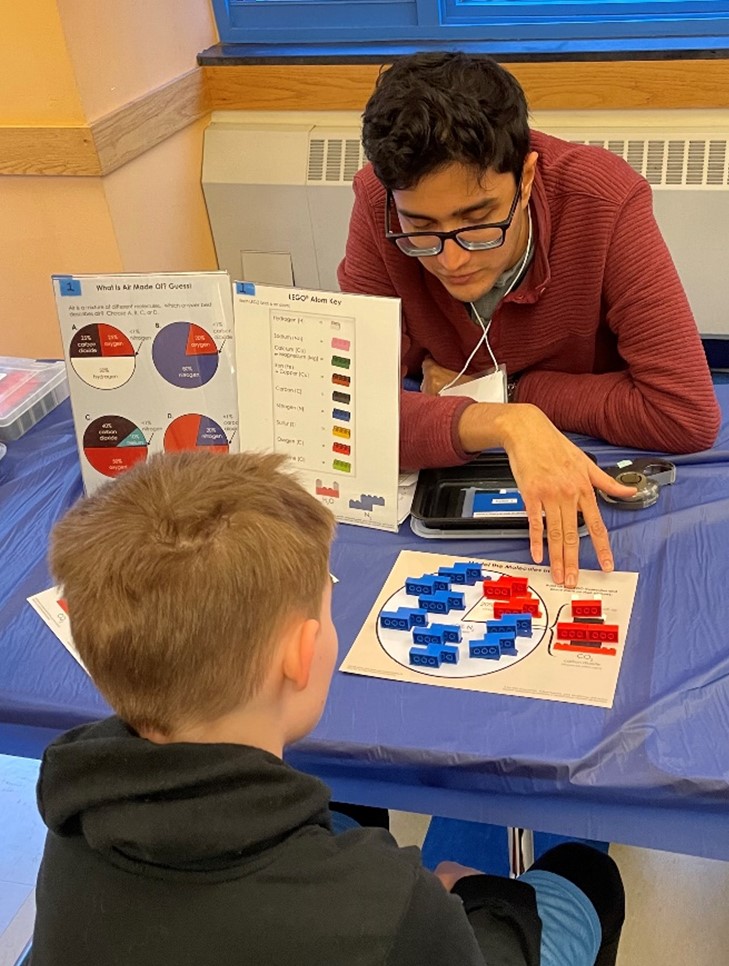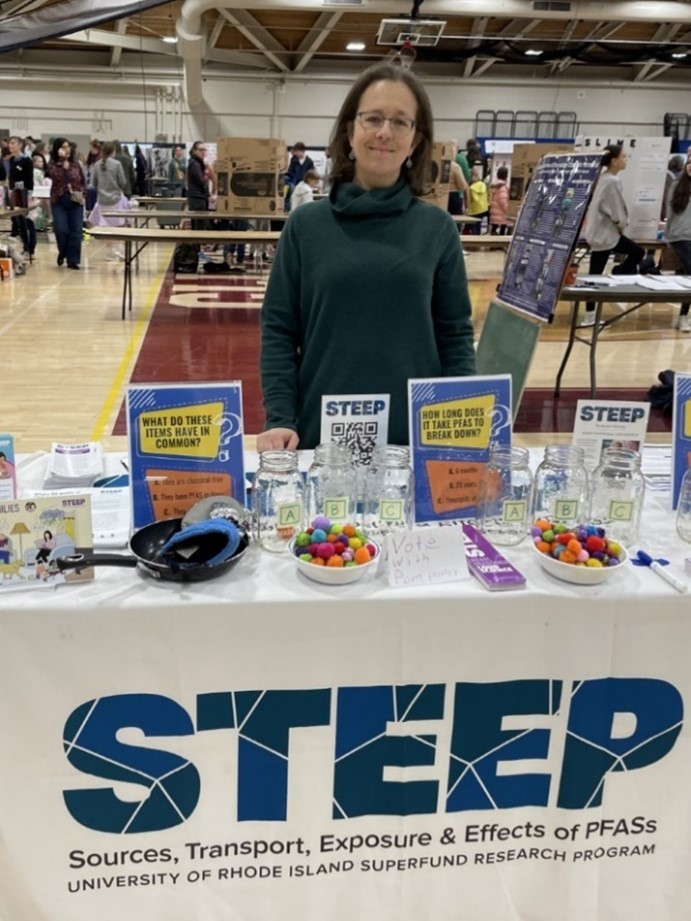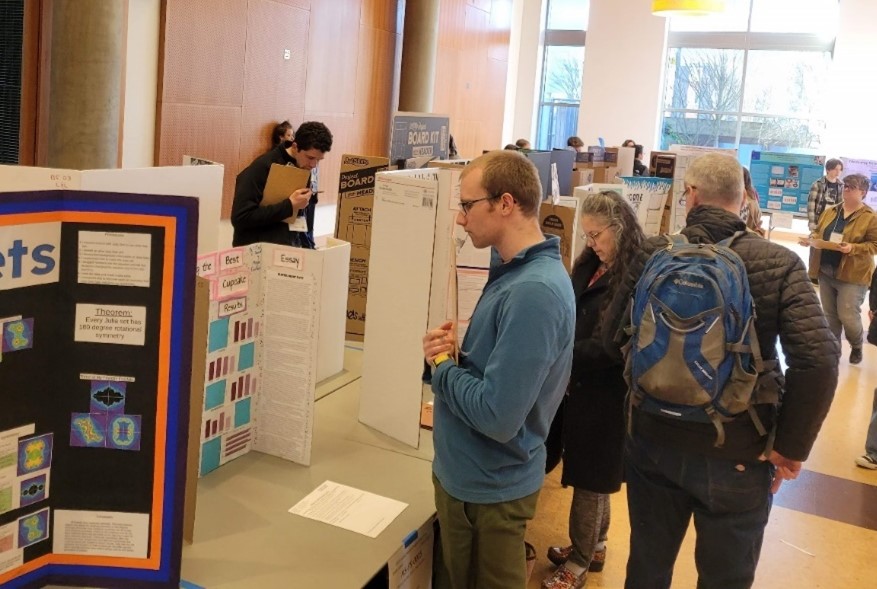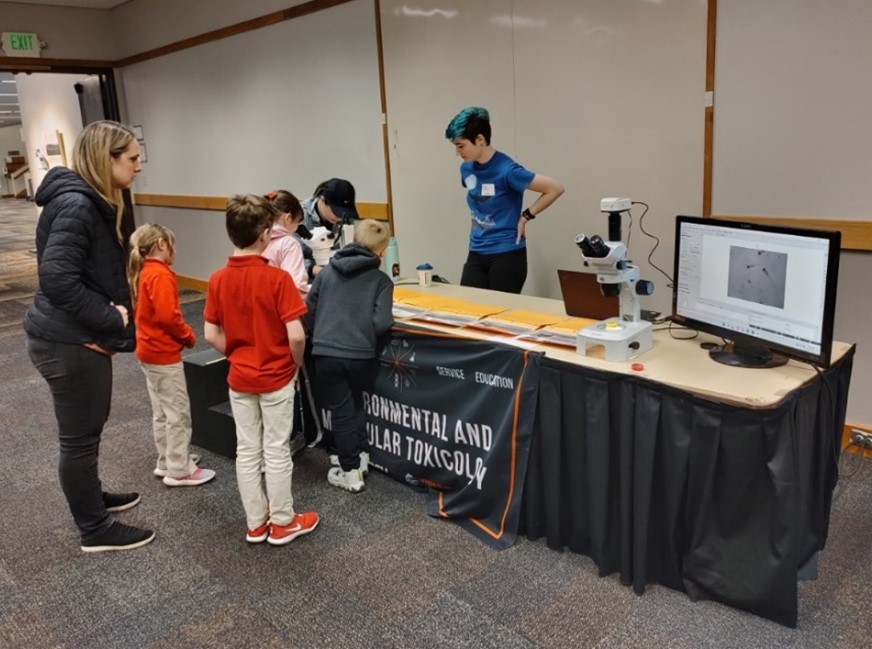Superfund Research Program
May 2023
By Lauren Sprouse
A key goal of the NIEHS Superfund Research Program (SRP) is to train future generations of scientists — in the lab and in the community. SRP Centers across the country have been doing just that, participating in community events to teach school-aged children about science.
Bonding Through Chemistry
Kathleen Vandiver, Ph.D., Community Engagement Core (CEC) lead at the Massachusetts Institute of Technology (MIT) SRP Center, and five trainees attended the Wilmington, Massachusetts school district's Science, Technology, Engineering, and Math (STEM) Fair. The STEM Fair drew over 400 participants, nearly doubling attendance from previous years.

MIT SRP engaged children to show how pollutants in their environment can affect their health. Using LEGO bricks, the team introduced children to the names of atoms present in air pollutants and showed how the atoms fit together into molecules.
"I think kids are naturally curious — it's a lot of fun explaining science to them and watching them link together concepts on their own," said doctoral trainee Barathkumar Baskaran. "It empowers them to explore the topics on their own more independently as well, even after the event has ended, and helps prepare them for seeing concepts later in high school."
According to Vandiver, hands-on activities can improve environmental health literacy in an inviting way without requiring a technical background.
"The STEM Fair provided our SRP trainees with a breath of fresh air from their lab work," Vandiver said. "It also provided them with a uniquely positive experience in community engagement, which will serve them in their future careers."
Communicating PFAS Contamination
Laurel Schaider, Ph.D., CEC co-lead at the Sources, Transport, Exposure & Effects of PFAS (STEEP) SRP Center, attended a Science, Technology, Engineering, Art, and Math (STEAM) Fair in Falmouth, Massachusetts.

Students of all ages showcased their science projects for family, friends, and the community, with hands-on activities and informational materials from exhibitors. Schaider hosted an activity table centered on per- and polyfluoroalkyl substances (PFAS) contamination.
Like many other communities throughout the U.S., the Falmouth public water supply has been contaminated by PFAS. According to Schaider, the STEAM Fair provided an opportunity to talk with students and their parents about what PFAS are, where they are found, and why they pose health concerns.
Schaider spoke with around 100 Falmouth residents, who went home with fact sheets, stickers and coloring sheets, and new information about PFAS.
"Even participants who knew about PFAS were surprised to learn that PFAS are found in dental floss and many other everyday items," Schaider said. "Our multiple-choice questions initiated conversations about the extreme persistence of PFAS and widespread exposures in the general population."
Empowering the Next Generation

Oregon State University SRP trainees volunteered at three events to spark students' curiosity in science: the Central Western Oregon Science Expo, Discovering the Scientist Within, and OSU Discovery Days.
SRP trainees served as judges for the Science Expo, which allows middle and high school students to engage in the scientific method and present their research. According to Kim Brown, MBA, CEC program manager at the OSU SRP Center, this activity helped SRP trainees develop outreach and engagement skills while also serving as mentors to the young scientists.
"One student wanted to bake the perfect pie crust, another wanted to know the heat tolerance of algae that dwell in coral, and two had projects on the impacts of social media use on their peers," said OSU trainee Christian Rude. "These real-life applications help students develop critical thinking and self-learning skills, both hugely important in science and beyond."
Diana Rohlman, Ph.D., OSU CEC co-lead is on the planning committee for Discovering the Scientist Within, a program to increase the participation of women in STEM fields. At this year's workshop, SRP trainees led an activity to teach 6-8th grade girls about dose-response in toxicology. They applied different "doses" of salt to spinach leaves and determined toxicity by measuring inhibition of photosynthesis. According to trainee Mackenzie Morshead, the activity was less about presenting a particular finding, and more about fostering interest in science and toxicology and empowering the next generation.

"Students come from different schools and different grade levels, so being able to teach everyone something about the scientific method, biology, toxicology, and data analysis in under an hour was an especially fun challenge," said Emily Bonner, a trainee at the center.
During Discovery Days, SRP trainees hosted a table for elementary school students to observe zebrafish embryos and larva under stereomicroscopes — advanced tools that provide a three-dimensional view of the fish.
"The event provided trainees an opportunity to engage with both child and adult audiences showcasing a tool that we use in our labs," Rude said. "By letting kids and adults see firsthand the models we use, and how we use them, we build trust and improve scientific understanding within the community."
Learning with Local Communities
Other SRP Centers showcased their community-engaged education activities in events with local students.
The Wayne State University SRP Center hosted over 100 middle school students from Neinas Dual Learning Academy in Detroit, Michigan, as part of Neinas Chemistry Day.
Students toured chemistry labs and participated in hands-on activities to encourage their enthusiasm for science. Judy Westrick, Ph.D., the center's Chemical Analysis Core co-lead, talked with them about careers in chemistry and the sciences.
Chiara Klein, Program Coordinator for Community Engagement at the Duke University SRP Center, ran a hands-on activity about testing for contaminants in fish at a Youth Climate Summit Eco-Fair in Durham, North Carolina.
The University of Louisville SRP Center hosted students from the Grace James Academy for Excellence, an all-girls middle school in West Louisville, Kentucky. Center Director Sanjay Srivastava, Ph.D., gave students a tour of their labs and spoke about the negative effects of Superfund chemicals on cardiometabolic health.
Jamie Young, Ph.D., co-lead of Louisville's Research Experience and Training Coordination Core, led a water and soil sampling event with students and teachers from Henderson County High School in Henderson, Kentucky. Young showed the students how to collect samples to test for the presence of heavy metals and PFAS chemicals.


